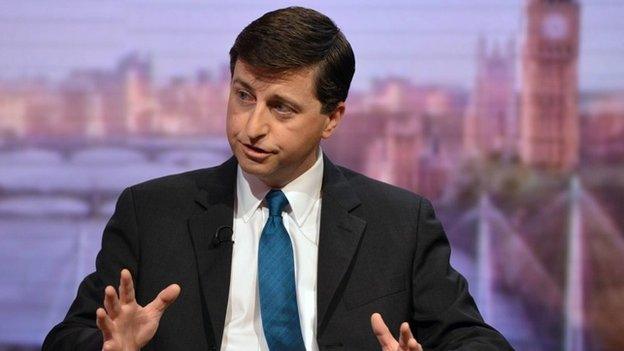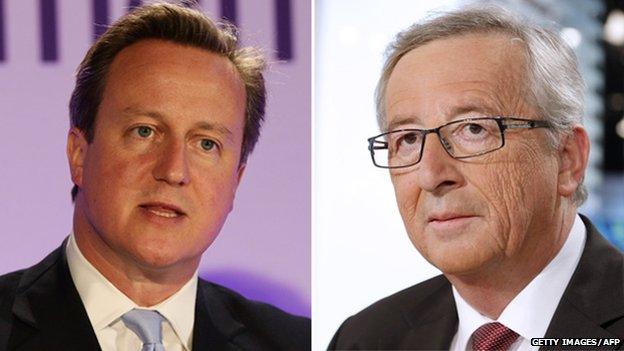Labour attacks Cameron over 'mishandled' Juncker talks
- Published

Douglas Alexander has criticised David Cameron's diplomatic abilities
Labour has gone on the attack as David Cameron's bid to block Jean-Claude Juncker becoming the next European Commission president looks set to fail.
Britain's main opposition party shares the prime minister's concerns about Mr Juncker's candidacy.
But it has accused him of "mishandling" talks with other EU leaders.
Shadow Foreign Secretary Douglas Alexander said he should have focused on building alliances instead of public criticism.
Britain regards Mr Juncker, an architect of monetary union who has spent his career promoting closer political ties between EU member states, as a roadblock to the kind of changes voters are demanding in Europe.
The UK says other EU nations have expressed similar reservations in private about the former Luxembourg prime minister, but any hopes Britain had of forming an alliance to block his candidacy, which is backed by Germany, appear to be fading fast.
'Moral victory'
Mr Cameron has vowed to fight Mr Juncker's candidacy "until the end" and is planning a last-ditch appeal to the other EU states to stick to the tradition by which Commission presidents are chosen by a process of consensus by all 28 national leaders, meeting in the European Council.
This is the first time the Commission president has been chosen in conjunction with Euro MPs - Mr Juncker is the choice of the centre-right European People's Party, the largest voting bloc in the Brussels Parliament.
BBC Political Editor Nick Robinson said Mr Cameron was "determined to try to snatch a moral victory from the jaws of a certain negotiating defeat" at the EU summit which begins later on Thursday.
"Downing Street wants the story of this summit to be the splendid isolation of one man, one country, fighting for a vital democratic principle rather than the prime minister's total failure to build alliances," he adds.
Jean-Claude Juncker is confident he will become the next EC president if "common sense prevails"
But Labour is determined that the story of the summit will be Mr Cameron's mishandling of negotiations and failure to build alliances.
"The next 24 hour hours represents a key test for the prime minister and his ability to deliver a candidate that would be acceptable here in Britain and people would want across Europe," Douglas Alexander told BBC Radio 4's Today programme.
He added: "The handling of these negotiations have turned a Europe divided over Jean Claude Juncker into a Europe apparently united against David Cameron."

EU leaders are gathering in Ypres, Belgium, for a World War One commemoration
Accusing Mr Cameron of "playing the man, not the ball," the shadow foreign secretary said: "My personal judgement is he was too public, too personal in his attacks, too early, with the result that public criticism got confused with private influence.
"What we needed was to work to build an alliance with countries that were themselves unconvinced by Jean-Claude Juncker's candidacy - countries like Sweden, Denmark, Holland, Hungary, Italy. There was an alliance there to be built.
"But, alas, it appears that the prime minister so badly misjudged his tactics and his strategy that that's not going to become the outcome in the next 24 hours."
He repeated his party's belief that Mr Juncker was not the "ideal candidate" for the EU's top job as he did not embody the "appetite for change" expressed by voters in the recent European elections.
The UK's Europe minister David Lidington said the issue Mr Cameron had with Mr Juncker was not because of his personality, but a point of principle.
"The idea that we're now seeing the bosses of the party factions in the European parliament get together and stitch up in advance the people who the heads of government of the European countries are allowed to vote for is, we think, an abuse of the treaty," he said.
The EU summit starts on Thursday after leaders first commemorate the 100th anniversary of the start of World War One in Ypres.
That ceremony will be followed by a working dinner on the EU's long-term policy agenda in Brussels, before EU leaders make a decision on the Commission presidency on Friday.
- Published25 June 2014
- Published25 June 2014
